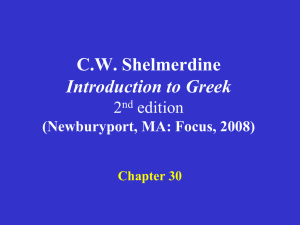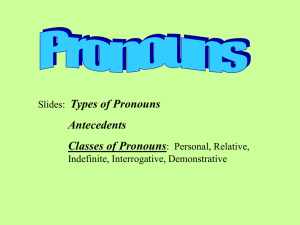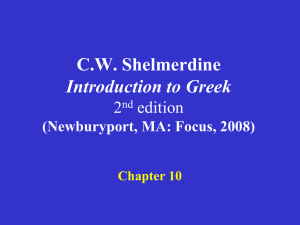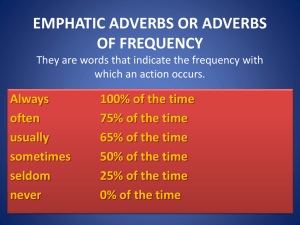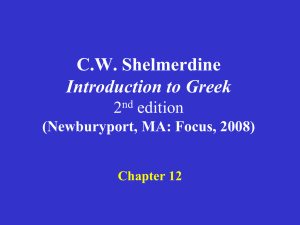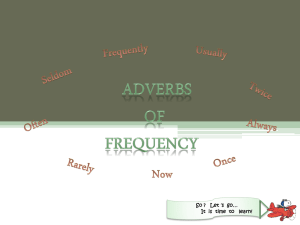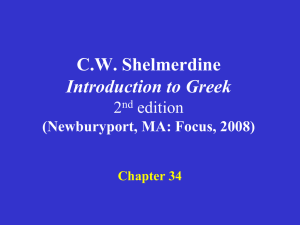Shelmerdine Chapter 29
advertisement
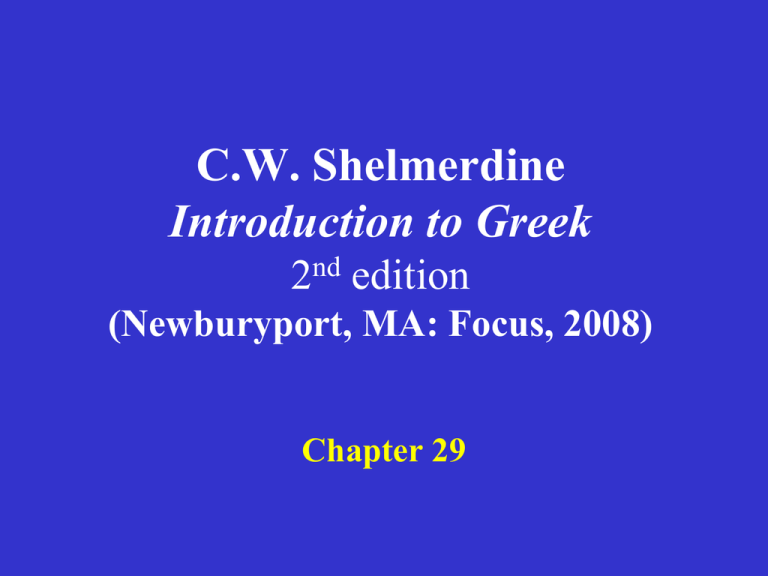
C.W. Shelmerdine Introduction to Greek 2nd edition (Newburyport, MA: Focus, 2008) Chapter 29 Shelmerdine Chapter 29 1. 2. 3. 4. 5. 6. Adverbs ἔχω + adverb μάλα, μᾶλλον, μάλιστα The interrogative pronoun/adjective The indefinite pronoun/adjective Interrogative and indefinite adverbs Shelmerdine Chapter 29 3. Adverbs • Adverbs in Greek derive from case forms of nouns. In some cases, their origin as a case was completely forgotten. – • For example, some feminine dative singular forms function as adverbs: ταύτῃ “this way” κοινῇ “in common” λάθρᾳ “in secret” ἰδίᾳ “individually” As such, adverbs frequently resemble noun forms and consistently accent like nouns. Shelmerdine Chapter 29 3. Adverbs • Basic forms of all three degrees of adverbs are identical with, or nearly so, specific forms of the adjectives from which they derive. – Positive degree is the genitive plural with –ς replacing the final -ν. • σοφός -ή -όν “wise” σοφῶν σοφῶς “wisely” • The ending derives from the lost ablative case. Shelmerdine Chapter 29 3. Adverbs • Basic forms of all three degrees of adverbs are identical with, or nearly so, specific forms of the adjectives from which they derive. – Comparative degree is the neuter singular nom/acc. • σοφώτερος -α -ον “wiser” σοφώτερον “more wisely” Shelmerdine Chapter 29 3. Adverbs • Basic forms of all three degrees of adverbs are identical with, or nearly so, specific forms of the adjectives from which they derive. – Superlative degree is the neuter plural nom/acc. • σοφώτατος -η -ον “wisest” σοφώτατα “most wisely” Shelmerdine Chapter 29 1. 2. 3. 4. 5. 6. Adverbs ἔχω + adverb μάλα, μᾶλλον, μάλιστα The interrogative pronoun/adjective The indefinite pronoun/adjective Interrogative and indefinite adverbs Shelmerdine Chapter 29 2. ἔχω + adverb: • Greek uses ἔχω + an adverb to indicate a state of being, where English colloquially uses “be,” “do,” or “go.” – πῶς ἔχεις; “How are you?” or “How’s it going?” or – – – – “How are you doing?” ἔχω καλῶς. “I’m doing fine.” or “I’m fine.” κακῶς ἔχει. “It’s bad.” or “It’s going badly.” τούτως ἔχει. “That’s how it goes.” or “That’s how it is.” Cf. εὖ λέγεις. “That’s good.” (literally, “You speak well” “You speak good news”). Cf. English “eulogy” Shelmerdine Chapter 29 1. 2. 3. 4. 5. 6. Adverbs ἔχω + adverb μάλα, μᾶλλον, μάλιστα The interrogative pronoun/adjective The indefinite pronoun/adjective Interrogative and indefinite adverbs Shelmerdine Chapter 29 3. μάλα, μᾶλλον, μάλιστα • Like English, Greek has generic comparative and superlative adverbs. – Positive degree • μάλα “much, very” – Comparative degree • μᾶλλον “more” – Superlative degree • μάλιστα “most” Shelmerdine Chapter 29 1. 2. 3. 4. 5. 6. Adverbs ἔχω + adverb μάλα, μᾶλλον, μάλιστα The interrogative pronoun/adjective The indefinite pronoun/adjective Interrogative and indefinite adverbs Shelmerdine Chapter 29 4. The interrogative pronoun/adjective • • • • • • This chapter introduces the interrogative pronoun in Greek. This pronoun serves the function of “who?” “what?” “which?” “whose?” and “whom?” in English. Who is speaking? What are they saying? Which (or what) horse do you like? Whose horse is that? To whom are you speaking? Shelmerdine Chapter 29 4. The interrogative pronoun/adjective • • The interrogative pronoun τίς τί has the stem τιν– and uses third declension endings. It ALWAYS bears an acute accent on its first syllable. – – Even single-syllable forms never change their accent to a grave as other words normally do. τίς λέγει; Who is speaking? Shelmerdine Chapter 29 4. The interrogative pronoun/adjective • The interrogative pronoun τίς τί Who? What?: Masc/Fem τίς τίνες Neuter τί τίνα τίνος τίνων τίνι τίσι τίνα τίνας τί τίνα Shelmerdine Chapter 29 4. The interrogative pronoun/adjective • • τίς λέγει; Who is speaking? τί λέγουσιν; What are they saying? – • • • τί sometimes translates better as “why?” (“Why are they saying that?” φιλεῖς τίνα ἵππον; Which (or what) horse do you like? τίνος ἵππος ἐστίν; Whose horse is that? τίνι λέγεις; To whom are you speaking? Shelmerdine Chapter 29 1. 2. 3. 4. 5. 6. Adverbs ἔχω + adverb μάλα, μᾶλλον, μάλιστα The interrogative pronoun/adjective The indefinite pronoun/adjective Interrogative and indefinite adverbs Shelmerdine Chapter 29 5. The indefinite pronoun/adjective • • This chapter introduces the indefinite pronoun/adjective τις τι in Greek. The indefinite forms look exactly like the interrogative forms, except the indefinite forms are all enclitic (and thus normally have no accent), while the interrogative forms must bear an acute accent. Shelmerdine Chapter 29 5. The indefinite pronoun/adjective • τις τι follows a word it modifies, usually immediately after it as an enclitic suffix. – – – τίς λέγει; Who is speaking? τίς Ἀθηναῖος λέγει; What Athenian is speaking? Ἀθηναῖός τις λέγει. Some Athenian is speaking. Shelmerdine Chapter 29 5. The indefinite pronoun/adjective • τις τι, as an enclitic, can never begin a clause: – – – – τίς λέγει; Who is speaking? ὁ Ἀθηναῖος λέγει. The Athenian is speaking. Ἀθηναῖός τις λέγει. Some Athenian is speaking. λέγει τις. Someone is speaking. Shelmerdine Chapter 29 1. 2. 3. 4. 5. 6. Adverbs ἔχω + adverb μάλα, μᾶλλον, μάλιστα The interrogative pronoun/adjective The indefinite pronoun/adjective Interrogative and indefinite adverbs Shelmerdine Chapter 29 6. Interrogative and indefinite adverbs • Like τίς τί/τις τι, six other adverbs in Greek have enclitic indefinite and accented interrogative forms: Indefinite (& enclitic) πῃ (somehow) ποθεν (from somewhere) ποι (to somewhere) που (somewhere) ποτε (some time) πως (somehow) Interrogative πῇ (how?) πόθεν (where from?) ποῖ (where to?) ποῦ (where?) πότε (when?) πῶς (how?) Shelmerdine Chapter 29 There is a .pdf posted in Moodle which arranges all the enclitics in Greek together on one page. Shelmerdine Chapter 29 for tomorrow (Tuesday, April 5, 2011): • Quiz: vocabulary. – Interrogative adverbs: omit πόθεν, ποῖ – Indefinite adverbs: omit ποθέν, ποι • Biblical Reading for Chapter 29. • No class meeting Wednesday April 6 or Thursday April 7, 2011. Shelmerdine Chapter 29 ὁ δὲ Κῦρος, ὅτε ἦν δεκαετὴς καὶ ἔτι ἐνομίζετο εἶναι παῖς τοῦ βουκόλου, ἔπαιζεν ἐν τῇ κώμῃ μετ' ἄλλων τινῶν παίδων. καὶ οὗτοι παίζοντες εἵλοντο ἑαυτῶν βασιλέα εἶναι αὐτόν. τοῦ δὲ Κύρου κελεύσαντος, οἱ μὲν αὐτῶν οἰκίας παρεσκεύαζον, οἱ δὲ δορυφόροι ἦσαν, οἱ δὲ ἄλλα ἔργα ἐποίουν. Shelmerdine Chapter 29 ὁ δὲ Κῦρος, ὅτε ἦν δεκαετὴς καὶ ἔτι ἐνομίζετο εἶναι παῖς τοῦ βουκόλου, ἔπαιζεν ἐν τῇ κώμῃ μετ' ἄλλων τινῶν παίδων. καὶ οὗτοι παίζοντες εἵλοντο ἑαυτῶν βασιλέα εἶναι αὐτόν. τοῦ δὲ Κύρου κελεύσαντος, οἱ μὲν αὐτῶν οἰκίας παρεσκεύαζον, οἱ δὲ δορυφόροι ἦσαν, οἱ δὲ ἄλλα ἔργα ἐποίουν. Shelmerdine Chapter 29 τούτων δὴ τῶν παίδων τις, παῖς ὢν Ἀρτεμβάρους, ἀνδρὸς δοκίμου ἐν Μήδοις, οὐ γὰρ δὴ ἐποίησεν ἃ ὁ Κῦρος προσέταξεν, ἐκέλευε ὁ Κῦρος τοὺς ἄλλους παῖδας αὐτὸν λαβεῖν. πειθομένων δὲ τῶν παίδων, ὁ Κῦρος τὸν παῖδα μάστιγι ἐκόλασεν· ὁ δὲ, ἐπεὶ ἀπέφυγεν, μάλιστα ὀργιζόμενος ἤγγειλε τὸ γενόμενον τῷ πατρί. Shelmerdine Chapter 29 τούτων δὴ τῶν παίδων τις, παῖς ὢν Ἀρτεμβάρους, ἀνδρὸς δοκίμου ἐν Μήδοις, οὐ γὰρ δὴ ἐποίησεν ἃ ὁ Κῦρος προσέταξεν, ἐκέλευε ὁ Κῦρος τοὺς ἄλλους παῖδας αὐτὸν λαβεῖν. πειθομένων δὲ τῶν παίδων, ὁ Κῦρος τὸν παῖδα μάστιγι ἐκόλασεν· ὁ δὲ, ἐπεὶ ἀπέφυγεν, μάλιστα ὀργιζόμενος ἤγγειλε τὸ γενόμενον τῷ πατρί. Shelmerdine Chapter 29 ὁ δ' Ἀρτεμβάρης, ὀργῇ ὡς εἶχε ἐλθὼν παρὰ τὸν Ἀστυάγη καὶ ἅμα ἄγων τὸν παῖδα, εἶπεν, Ὦ βασιλεῦ, ὑπὸ τοῦ σοῦ δούλου, βουκόλου δὲ παιδὸς ὧδε ὑβρίζμεθα, δεικνὺς τοὺς τοῦ παιδὸς ὤμους. ἀκούσας δὲ καὶ ἰδών, ὁ Ἀστυάγης ἐθέλων κολάσαι τὸν παῖδα τιμῆς τῆς Ἀρτεμβάρους ἕνεκα, μετεπέμπετο τὸν τε βουκόλον καὶ τὸν παῖδα. Shelmerdine Chapter 29 ὁ δ' Ἀρτεμβάρης, ὀργῇ ὡς εἶχε ἐλθὼν παρὰ τὸν Ἀστυάγη καὶ ἅμα ἄγων τὸν παῖδα, εἶπεν, Ὦ βασιλεῦ, ὑπὸ τοῦ σοῦ δούλου, βουκόλου δὲ παιδὸς ὧδε ὑβρίζμεθα, δεικνὺς τοὺς τοῦ παιδὸς ὤμους. ἀκούσας δὲ καὶ ἰδών, ὁ Ἀστυάγης ἐθέλων κολάσαι τὸν παῖδα τιμῆς τῆς Ἀρτεμβάρους ἕνεκα, μετεπέμπετο τὸν τε βουκόλον καὶ τὸν παῖδα. Shelmerdine Chapter 29 …Καὶ τίς ἐστίν μου πλησίον; 30 ὑπολαβὼν ὁ Ἰησοῦς εἶπεν, Ἄνθρωπός τις κατέβαινεν ἀπὸ Ἰερουσαλὴμ εἰς Ἰεριχὼ καὶ λῃσταῖς περιέπεσεν, οἳ καὶ ἐκδύσαντες αὐτὸν καὶ πληγὰς ἐπιθέντες ἀπῆλθον ἀφέντες ἡμιθανῆ. ἀφέντες masc. nom. pl. aor. part. act. < ἀφίημι let go, leave ἐκδύω strip off ἐπιθέντες < ἐπι-τίθημι put on ἡμιθανής –ές half-dead καταβαίνω walk down, descend λῃστής –οῦ ὁ robber περιέπεσεν < περιπίπτω encounter πληγή -ῆς ἡ beating πλησίον near, neighbor ὑπολαμβάνω answer, take up Shelmerdine Chapter 29 31 κατὰ συγκυρίαν δὲ ἱερεύς τις κατέβαινεν ἐν τῇ ὁδῷ ἐκείνῃ, καὶ ἰδὼν αὐτὸν ἀντιπαρῆλθεν· 32 ὁμοίως δὲ καὶ Λευίτης [γενόμενος] κατὰ τὸν τόπον ἐλθὼν καὶ ἰδὼν ἀντιπαρῆλθεν. ἀντιπαρέρχομαι pass by (παρά) on the other side (ἀντί) καταβαίνω walk down, descend ὁμοίως likewise, the same way συγκυρία –ας ἡ chance, coincidence τόπος –ου ὁ way, path Shelmerdine Chapter 29 33 Σαμαρίτης δέ τις ὁδεύων ἦλθεν κατ’ αὐτὸν καὶ ἰδὼν ἐσπλαγχνίσθη, 34 καὶ προσελθὼν κατέδησεν τὰ τραύματα αὐτοῦ ἐπιχέων ἔλαιον καὶ οἶνον, ἐπιβιβάσας δὲ αὐτὸν ἐπὶ τὸ ἴδιον κτῆνος ἤγαγεν αὐτὸν εἰς πανδοχεῖον καὶ ἐπεμελήθη αὐτοῦ. ἔλαιον –ου τό olive oil ἐπιβιβάζω place upon ἐπιμελέομαι care for/about ἐπιχέω pour on ἴδιος –α -ον his/her own καταδέω bind up, bandage κτῆνος –ους τό animal ὁδεύω travel (do the road) οἶνος –ου ὁ wine πανδοχεῖον –ου τό inn προσέρχομαι go to σπλαγχνίζομαι have pity τραύμα –ατος τό wound Shelmerdine Chapter 29 35 καὶ ἐπὶ τὴν αὔριον ἐκβαλὼν ἔδωκεν δύο δηνάρια τῷ πανδοχεῖ καὶ εἶπεν, Ἐπιμελήθητι αὐτοῦ, καὶ ὅ τι ἂν προσδαπανήσῃς ἐγὼ ἐν τῷ ἐπανέρχεσθαί με ἀποδώσω σοι. 36 τίς τούτων τῶν τριῶν πλησίον δοκεῖ σοι γεγονέναι τοῦ ἐμπεσόντος εἰς τοὺς λῃστάς; 37 ὁ δὲ εἶπεν, Ὁ ποιήσας τὸ ἔλεος μετ’ αὐτοῦ. εἶπεν δὲ αὐτῷ ὁ Ἰησοῦς, Πορεύου καὶ σὺ ποίει ὁμοίως. αὔριον tomorrow, the next day γεγονέναι perfect inf. < γίγνομαι δηνάριον –ου τό denarius [a coin] δοκέω appear seem δύο two ἐκβάλλω take out ἔλεος –ους τό mercy ἐμπεσόντος < ἐμπίπτω encounter ἐπανέρχομαι return ἐπιμελέομαι care for/about λῃστής –οῦ ὁ robber ὁμοίως likewise, the same way πανδοχεύς –έως ὁ innkeeper πλησίον near, neighbor προσδαπανέω spend additionally τρεῖς, τρία three Shelmerdine Chapter 29 No class meeting Wednesday April 6 or Thursday April 7, 2011. for next class (Monday, April 11, 2011): • Quiz: parsing on Chapter 29 Biblical Reading • Read Chapter 30
